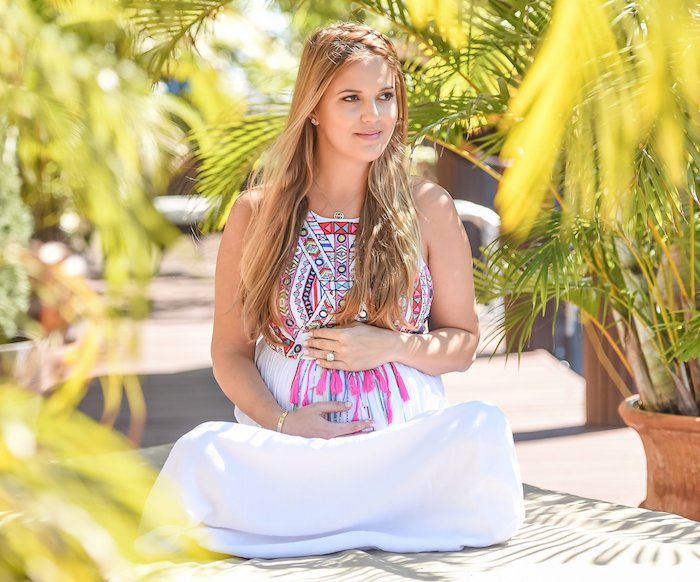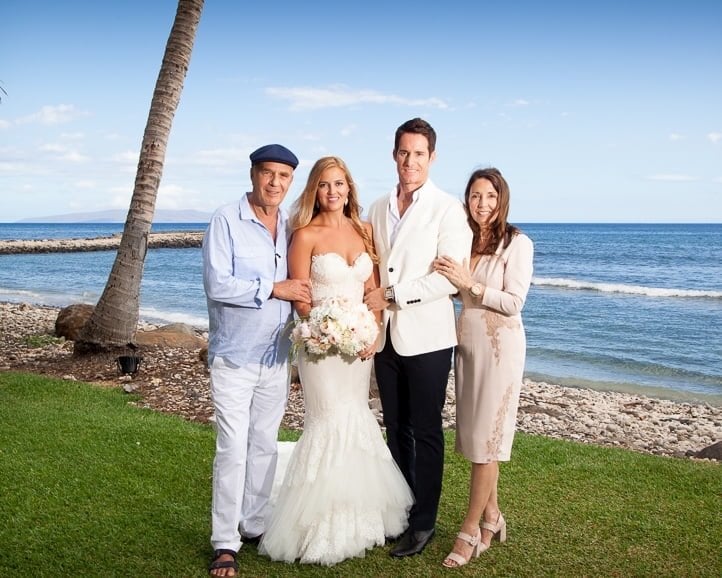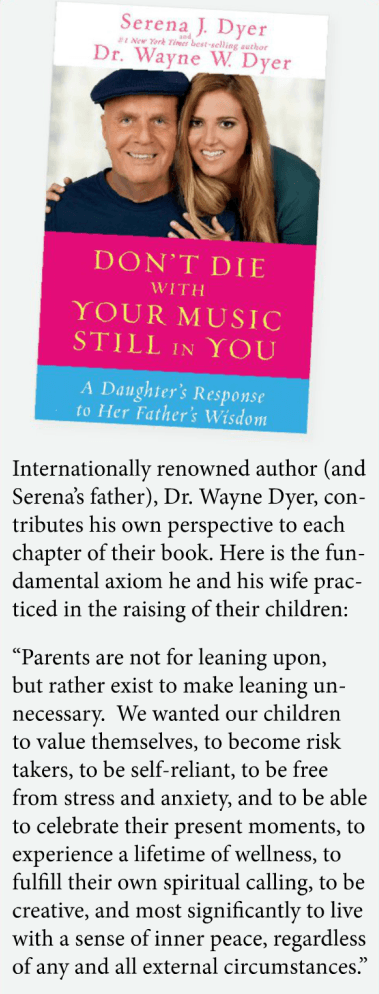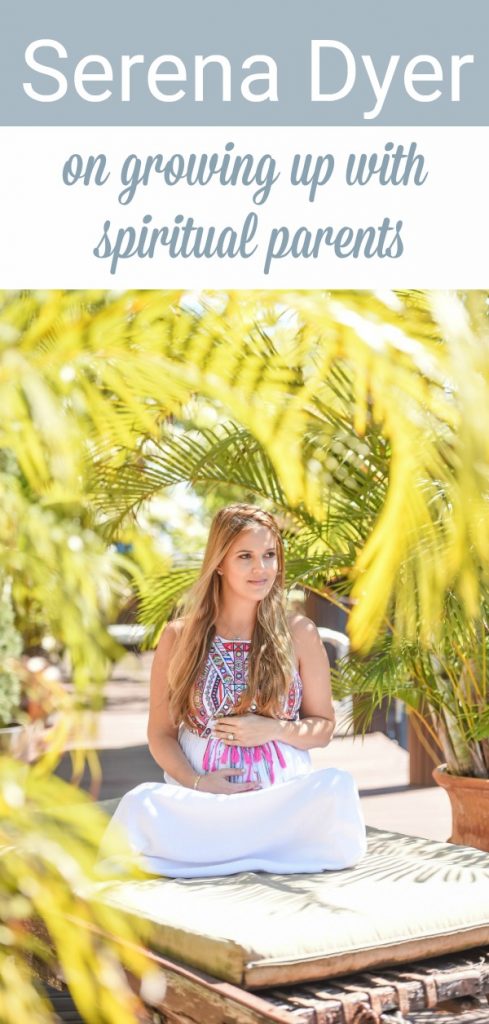Serena Dyer on Growing up with Spiritual Parents, Attachment Parenting, and Her New Book
 Natural parenting doesn’t always come… naturally. Some of us are still working through less than ideal habits and patterns that were handed to us by our own parents. And even for those of us with a healthy upbringing, it can be challenging to tune in and access our intuition in this noisy world.
Natural parenting doesn’t always come… naturally. Some of us are still working through less than ideal habits and patterns that were handed to us by our own parents. And even for those of us with a healthy upbringing, it can be challenging to tune in and access our intuition in this noisy world.
Imagine if you got to skip much of the learning curve… having been raised with the principals of attachment parenting by compassionate, spiritually conscious parents.
That’s just the perspective Serena Dyer brings to life (and soon to motherhood) as she awaits the birth of her first child this spring. Her book, Don’t Die With Your Music Still In You, co-authored with her father, Dr. Wayne Dyer, is an enlightening look at her experience growing up in a spiritual environment.
Our editor, Amity Hook-Sopko, spoke with Serena about the book and how finding her own music has prepared her for this new chapter in her life.
“Don’t die with your music still in you” is a beautifully poignant motto. What was it like growing up with that inspiration and challenge?
Serena: It really was both inspiring and challenging. My parents believe that each child comes here with his or her own life purpose that is unique to them, and the best thing we can do is step back and let that music play – let that dharma unfold – rather than try to mold or shape it to what we think it should be.
That’s really what the book is all about. I think my parents not only did that for my siblings and me, but they really did that for themselves. You know, sometimes what we’re doing is so loud, our children can’t hear what we’re saying. They didn’t tell me to follow my passion while ignoring their own. They didn’t say, “Go after your dreams, but my dreams aren’t worth it.” Never. By watching them follow their dreams, I was given conscious and subconscious permission to do the same.
While attachment parenting seems to be the natural step for a spiritually conscious family, you write that for you, showing early signs of autism at a young age, it was life-altering.
Serena: Yes. I was the most troubled as a baby and young child of all of my seven siblings. As a baby, I would cry and scream in terror with my fists balled up as children often do when they’re experiencing stress or fear, but this was a constant state for me. By age two, I was rocking back and forth for hours, very sensitive to touch, and terrified of loud noises.
My parents maintained the idea that they would be committed to me no matter what. My mother wore me in a sling around the clock. No matter what type of behavior I was exhibiting, my family was taught to honor it and comfort me, rather than force me to “get over it.” They were just committed to me being loved 24/7.
I think my mom’s commitment to me in particular – wearing me, feeding me, holding me and maintaining that physical contact was life saving.
There are so many parents out there who just want what’s best for their child, and there are so many experts. Everyone has an opinion. I think what’s different with my parents is that rather than go to any expert to get their opinion, they just trusted themselves and the only thing they knew worked was letting their child know she was loved, because what is more supportive than that?

You’re so ahead of the game to already realize it’s nice to have the books for confirmation, but deep down, you already know what’s best. What are some other life lessons that have stayed with you?
Serena: My parents were consistently kind to strangers in front of us, and that became a habit for all of us. Sometimes when I hear a friend make a comment about how somebody looks, it strikes me as a little feeling of pain. I just never heard my family speak ill of other people. I really hope I can maintain that level of sincerity my parents had toward other human beings. If we were in the car and there was someone who was homeless or asking for money, my parents never said anything bad about their situation, or how they should get a job. It was more like, “Let’s take a moment and send that person love.”
I always knew my parents were going to be kind. There’s a safe feeling you experience as a child when you know your parent is someone who makes a kind choice. Some kids always see the “I’m not gonna get ripped off” choice or the using every situation to their advantage choice… and I think a little compassion can be extremely influential at those impressionable ages.
 In the book, you use a phrase I heard your father say, “You don’t attract in life what you want – you attract what you are.” Those words instantly shifted my life… like a quantum moment. It put so many things into perspective – why certain things have always gone well for me and why other challenges kept appearing. This is a principal you try to live by, too?
In the book, you use a phrase I heard your father say, “You don’t attract in life what you want – you attract what you are.” Those words instantly shifted my life… like a quantum moment. It put so many things into perspective – why certain things have always gone well for me and why other challenges kept appearing. This is a principal you try to live by, too?
Serena: I have to remind myself of that all the time. Some people really like that statement because it feels like freedom or free will: I have the power or ability to be in charge of my life. I can change who I am; and therefore, my life will change. And other people really don’t like it. (Laughs)
Some people go through life as though it’s just happening to them, not responding to them. I personally prefer to know that life is responding to me. I’ve been asked what are the challenges of being raised by spiritual parents. I’m not sure this is a downside, but it’s certainly different… If something bad happened to me, my parents didn’t take the approach that it was merely accidental. They didn’t blame me, but they would ask me to look at how I might be aligning with whatever the situation was. So it’s both a blessing and a challenge, I’ve grown up knowing that I’m very much a creator in my own life, but the challenge part is that some days I just wanted to say, “I got the flu because it’s flu season!”
So many people will complain about how they’re stuck or struggling in life. And it’s so obvious to see their thinking patterns have created it. But if you aren’t willing to consider another way, and if that’s the case, what can anyone do to help you? It doesn’t matter if you get a raise, or a divorce, or find the perfect man… if your thoughts are self-sabotaging, or keeping you angry and resentful, or feeling like life is out to get you, the doors are going to remain closed for you.
Wouldn’t the world be a peaceful place if we were all raised not to blame or judge others? Speaking of judgment, everyone has an opinion when you’re pregnant or a new mom. How are you handling this new stage in your life?
Serena: Everyone has been incredibly supportive. I only encountered one person I didn’t feel that way with, and I simply switched them. It wasn’t a big drama.
When it comes to judging other people, it’s really always about our own insecurity. If you don’t want to spend your life feeling judged, then maybe you should withhold the judgment of others. Because just like we said before… you get in life what you are. So if you are someone who is constantly offering criticism and condemnation of others, you’ll probably find yourself in the position where that’s happening to you. Why do you want to be there? There’s such a better place to be, and that place is… free.
I mention in the book that my dad used to say, “An eye for an eye makes the whole world blind.” And that really comes back to compassion. The compassion they’re not able to offer other people is usually a reflection of the compassion they’re not able to offer themselves, and typically those are the people who need the most love.
What would you say your parents each uniquely taught you?
Serena: My mother so beautifully modeled for me the benefit of embracing silence, and my father taught me to give up my personal history so I could experience the glory of living in the present. I learned to treasure my own magnificence, and that I am very much a piece of God’s perfection.
As my dad once said to my mom: “I thank you like the earth thanks the sun. Everything I am is because of your unconditional love. Thank you, thank you, thank you.”

